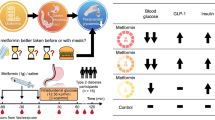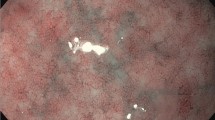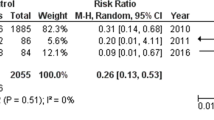Abstract
Oral zinc l-carnosine (Gastrozin®) 75 mg twice daily is an effective gastric mucoprotective option for the treatment and prevention of gastric ulcers. The two components of the chelated compound (i.e. zinc and l-carnosine in a 1:1 ratio) provide beneficial anti-inflammatory, antioxidant and other effects that work together to support the natural mucoprotective mechanisms of the gastrointestinal tract. Zinc l-carnosine 75 mg twice daily has well established efficacy in the treatment of gastric ulcers, and is at least as effective as other mucoprotectants in this indication. It consistently provides rapid healing of gastric ulcers regardless of their underlying cause, such as gastritis, Helicobacter pylori infection and endoscopic submucosal dissection (ESD), or concurrent pharmacological treatment (e.g. H. pylori eradication or proton pump inhibitor therapy).
Similar content being viewed by others
References
Choi HS, Kim ES, Keum B, et al. l-carnosine and zinc in gastric protection. In: Preedy VR, editor. Food and Nutritional Components in Focus. Cambridge: Royal Society of Chemistry; 2015. p. 548–65.
Myran L, Zarbock SD. Management of Helicobacter pylori infection. US Pharm. 2019;43(4):27–32.
Gastrozin (75 mg zinc l-carnosine tablet): package leaflet. Dubai: Synergy Pharma. 2019.
Hudson T. Nutrient profile: zinc-carnosine: a combination of zinc and l-carnosine improves gastric ulcers. Natural Med J. 2013;5:11.
Matsukura T, Tanaka H. Applicability of zinc complex of l-carnosine for medical use. Biochem (Mosc). 2000;65(7):817–23.
Soderberg TA, Sunzel B, Holm S, et al. Antibacterial effect of zinc oxide in vitro. Scan J Plast Reconstr Sug Hand Surg. 1990;24(3):93–107.
Prasad A. Zinc: an overview. Nutrition. 1995;11(1 Suppl):93–9.
Opoka W, Adamek D, Plonka M, et al. Importance of luminal and mucosal zinc in the mechanism of experimental gastric ulcer healing. J Physiol Pharmacol. 2010;61(5):581–91.
Korolkiewicz R, Fujita A, Seto K, et al. Polaprezinc exerts a salutary effect on impaired healing of acute gastric lesions in diabetic rats. Dig Dis Sci. 2000;45(6):1200–9.
Furata S, Toyama S, Miwa M, et al. Residence time of polaprezinc (zinc l-carnosine complex in the rat stomach and adhesiveness to ulcerous sites. Jpn J Pharmacol. 1995;67(4):271–8.
Gaby AR. Therapeutic agents part 2B: minerals. Nutritional medicine. 2nd ed. Concord (NH): Nutritional Medicine. 2017.
Ito M, Tanaka T, Suzuki Y. Effect of N-(3-aminopropionyl)-l-histidinato zinc (Z-103) on healing and hydrocortisone-induced relapse of acetic acid ulcers in rats with limited food intake-time. Jpn J Pharmacol. 1990;52(4):513–21.
Baan M, Sherding RG, Johnson SE. Effects of zinc-l-carnosine and vitamin E on aspirin-induced gastroduodenal injury in dogs. J Vet Intern Med. 2011;25(1):39–46.
Naito Y, Yoshikawa T, Yagi N, et al. Effects of polaprezinc on lipid peroxidation, neutrophil accumulation, and TNF-α expression in rats with aspirin-induced gastric mucosal injury. Dig Dis Sci. 2001;46(4):845–51.
Choi HS, Lim J, Chun HJ, et al. The effect of polaprezinc on gastric mucosal protection in rats with ethanol-induced gastric mucosal damage: comparison study with rebamipide. Life Sci. 2013;9(2–3):69–77.
Ko JK, Leung CC. Ginger extract and polaprezinc exert gastroprotective actions by anti-oxidant and growth factor modulating effects in rats. J Gastroenterol Hepatol. 2010;25(12):1861–8.
Shimada T, Watanabe N, Ohtuka Y, et al. Polaprezinc down-regulates proinflammatory cytokine-induced nuclear factor-κB activiation and interleukin-8 expression in gastric epithelial cells. J Pharmacol Exp Ther. 1999;291(1):345–52.
Handa O, Yoshida N, Tanaka Y, et al. Inhibitory effect of polaprezinc on the inflammatory response to Helicobacter pylori. Can J Gastroenterol. 2002;16(11):785–9.
Ishihara R, Iishi H, Sakai N, et al. Polaprezinc attenuates Helicobacter pylori-associated gastritis in Mongolian gerbils. Helicobacter. 2002;7(6):384–9.
Ito M, Shii D, Segami T, et al. Preventive actions of N-(3-aminopropionyl)-l-histidinato zinc (Z-103) through increases in the activities of oxygen-derived free radical scavenging enzymes in the gastric mucosa on ethanol-induced gastric mucosal damage in rats. Jpn J Pharmacol. 1992;59(3):267–77.
Yoshikawa T, Naito Y, Tanigawa T, et al. The antioxidant properties of a novel zinc-carnosine chelate compound, N-(3-aminopropionyl)-l-histidinato zinc. Biochim Biophys Acta. 1991;1115(5):15–22.
Ueda K, Ueyama T, Oka M, et al. Polaprezinc (zinc l-carnosine) is a potent inducer of anti-oxidative stress enzyme, heme oxygenase (HO)-1: a new mechanism of gastric mucosal protection. J Pharmacol Sci. 2009;110(3):285–94.
Omatsu T, Naito Y, Handa O, et al. Reactive oxygen species-quenching and anti-apoptotic effect of polaprezinc on indomethacin-induced small intestinal epithelial cell injury. J Gastroenterol. 2010;45(7):692–702.
Fujii Y, Matsura T, Kai M, et al. Protection by polaprezinc, an anti-ulcer drug, against indomethacin-induced apoptosis in rat gastric mucosal cells. Jpn J Pharmacol. 2000;84(1):63–70.
Yoshikawa T, Yamaguchi T, Yoshida N, et al. Effect of Z-103 on TNB-induced colitis in rats. Digestion. 1997;58(5):464–8.
Hiraishi H, Sasai T, Oinuma T, et al. Polaprezinc protects gastric mucosal cells from noxious agents through antioxidant properties in vitro. Aliment Pharmacol Ther. 1999;13(2):261–9.
Yoshikawa T, Naito Y, Tanigawa T, et al. Effect of zinc-carnosine chelate compound (Z-103), a novel antioxidant, on acute gastric mucosal injury induced by ischemia-reperfusion in rats. Free Radic Res Commun. 1991;14(4):289–96.
Watanabe S, Wang XE, Hirose M, et al. Insulin-like growth factor I plays a role in gastric wound healing: evidence using a zinc derivative, polaprezinc, and an in vitro rabbit wound repair model. Aliment Pharmacol Ther. 1998;12(11):1131–8.
Odashima M, Otaka M, Jin M, et al. Induction of a 72-kDa heat-shock protein in cultured rat gastric mucosal cells and rat gastric mucosa by zinc l-carnosine. Dig Dis Sci. 2001;47(12):2799–804.
Wada I, Otaka M, Jin M, et al. Expression of HSP72 in the gastric mucosa is regulated by gastric acid in rats: correlation of HSP72 expression with mucosal protection. Biochem Biophys Res Commun. 2006;349(2):611–8.
Mahmood A, FitzGerald AJ, Marchbank T, et al. Zinc carnosine, a health food supplement that stabilises small bowel integrity and stimulates gut repair processes. Gut. 2007;56(2):168–75.
Watari I, Oka S, Tanaka S, et al. Effectiveness of polaprezinc for low-dose aspirin-induced small-bowel mucosal injuries as evaluated by capsule endoscopy: a pilot randomized controlled study. BMC Gastroenterol. 2013;13:108.
Mitani T, Shirasaka D, Miyachi H. Can polaprezinc be attributed to reduce the risk of gastric carcinogenesis in Helicobacter pylori-positive young people? [abstract no. 136]. Am J Gastroenterol. 2007;102(Suppl 2):S167.
Murakami K, Sato R, Okimoto T, et al. Influence of anti-ulcer drugs used in Japan on the result of 13C-urea breath test for the diagnosis of Helicobacter pylori infection. J Gastroenterol. 2003;38(10):937–41.
Miyoshi A, Matsuo H, Miwa T, et al. Clinical evaluation of Z-103 in the treatment of gastric ulcers: a multicenter double-blind dose finding study [in Japanese]. Jpn Pharmacol Ther. 1992;20(1):181–97.
Miyoshi A, Namiki M, Iwasaki A, et al. Clinical evaluation of Z-103 in the treatment of gastritis: a multicenter double-blind dose finding study [in Japanese]. Jpn Pharmacol Ther. 1997;25(5):1403–42.
Miyoshi A, Matsuo H, Miwa T, et al. Clinical evaluation of Z-103 in the treatment of gastritis: an open-label dose finding study [in Japanese]. Jpn Pharmacol Ther. 1992;20(1):245–54.
Miyoshi A, Matsuo H, Miwa T, et al. Clinical evaluation of Z-103 (polaprezinc) on gastric ulcer: a multicenter double-blind comparative study with cetraxate hydrochloride [in Japanese]. Jpn Pharmacol Ther. 1992;20(1):199–223.
Nakajima M. Clinical evaluation of Z-103 on gastritis: a double-blind controlled study using sucralfate as a comparator. Pharmacol Ther. 1997;25(4):325–66.
Kashimura H, Suzuki K, Hassan M, et al. Polaprezinc, a mucosal protective agent, in combination with lansoprazole, amoxycillin and clarithromycin increases the cure rate of Helicobacter pylori infection. Aliment Pharmacol Ther. 1999;13(4):483–7.
Tan B, Luo HQ, Xu H, et al. Polaprezinc combined with clarithromycin-based triple therapy for Helicobacter pylori-associated gastritis: a prospective, multicenter, randomized clinical trial. PLoS One. 2017;12(4):e0175625.
Sugimoto N, Yoshikawa T, Naito Y, et al. Triple therapy of lansoprazole + amoxicillin + metronidazole versus triple plus mucosal protective drug polaprezinc therapy for cure of Helicobacter pylori (HP) in gastric ulcer patients [abstract]. Gastroenterology. 1997;112:A300.
Baniya R, Upadhaya S, Chughtai K, et al. Is polaprezinc a missing link in Helicobacter pylori eradication therapy? A meta-analysis of randomized controlled trials of triple therapy with polaprezinc [abstract no. 1249]. Am J Gastroenterol. 2017;112(Suppl 1):S680-S1.
Isomoto H, Furusu H, Ohnita K, et al. Sofalcone, a mucoprotective agent, increases the cure rate of Helicobacter pylori infection when combined with rabeprazole, amoxicillin and clarithromycin. World J Gastroenterol. 2005;11(11):1629–33.
Inaba T, Ishikawa S, Toyokawa T, et al. Basal protrusion of ulcers induced by endoscopic submucosal dissection (ESD) during treatment with proton pump inhibitors, and the suppressive effects of polaprezinc. Hepatogastroenterology. 2010;57(99–100):678–84.
Jung DH, Park JC, Lee YC, et al. Comparison of the efficacy of polaprezinc plus proton pump inhibitor and rebamipide plus proton pump inhibitor treatment for ESD-induced gastric ulcers: a randomized prospective controlled study [abstract no. Mo1107]. Gastrointest Endosc. 2017;85(5 Suppl 1):AB431.
Dajani A, Abuhammour A. A modified sequential regimen of Helicobacter pylori treatment enforced by Bacillus clausii and zinc carnosine complex yields high eradication rates [abstract no. P-0040]. J Gastroenterol Hepatol. 2017;32(Suppl 3):61–2.
Dajani AI, Nounou MA, Fayadh MH, et al. Zinc carnosine complex improves the response to triple therapy of Helicobacter pylori eradication [abstract no. P-0279]. J Gastroenterol Hepatol. 2017;32(Suppl 3):72.
Ardesia M, Fries W, Palombieri A, et al. Influence of polaprezinc on efficacy of Helicobacter pylori eradication therapy in Italian population [abstract no. P.02.14]. Dig Liver Dis. 2017;49(Suppl 2):e143.
Ishihama H, Sayo S, Yokoyama T, et al. Preventive and therapeutic effects of polaprezinc suspension on oral mucosal injury [abstract no. P1-032]. Ann Oncol. 2013;24(Suppl 9):ix66.
Watanabe T, Ishihara M, Matsuura K, et al. Polaprezinc prevents oral mucositis associated with radiochemotherapy in patients with head and neck cancer. Int J Cancer. 2010;127(8):1984–90.
Yanase K, Funaguchi N, Iihara H, et al. Prevention of radiation esophagitis by polaprezinc (zinc l-carnosine) in patients with non-small cell lung cancer who received chemoradiotherapy. Int J Clin Exp Med. 2015;8(9):16215–22.
Sakae K, Agata T, Kamide R, et al. Effects of l-carnosine and its zinc complex (polaprezinc) on pressure ulcer healing. Nutr Clin Pract. 2013;28(5):609–16.
Acknowledgements
The manuscript was reviewed by: H. Parthasarathy, Department of Cardiology, Apollo Hospitals, Chennai, India, Y. Prashar, Department of Pharmacology, Rayat Institute of Pharmacy, Railmajra, India; S. Saluja, Saran Ashram Hospital, Dayalbagh, Agra, India; A.K. Srivastava, Department of Biotechnology, Indian Institute of Technology Roorkee, Roorkee, India. During the peer review process, Synergy Pharma, the marketing-authorization holder of the Gastrozin® formulation of zinc l-carnosine, was also offered an opportunity to provide a scientific accuracy review of their data. Changes resulting from comments received were made on the basis of scientific and editorial merit.
Author information
Authors and Affiliations
Corresponding author
Ethics declarations
Funding
The preparation of this review was not supported by any external funding.
Conflicts of interest
KA. Lyseng-Williamson is an employee of Adis International Ltd./Springer Nature and the Editor of Drugs & Therapy Perspectives; she has no other conflicts of interest to declare. The Editor of D&TP was not involved in any publishing decisions for the manuscript.
Additional information
Additional information
for this Adis Drug Q&A can be found at https://doi.org/10.6084/m9.figshare.9209471.
Rights and permissions
About this article
Cite this article
Lyseng-Williamson, K.A. Zinc l-carnosine in gastric ulcers: a profile of its use. Drugs Ther Perspect 35, 463–469 (2019). https://doi.org/10.1007/s40267-019-00667-z
Published:
Issue Date:
DOI: https://doi.org/10.1007/s40267-019-00667-z




